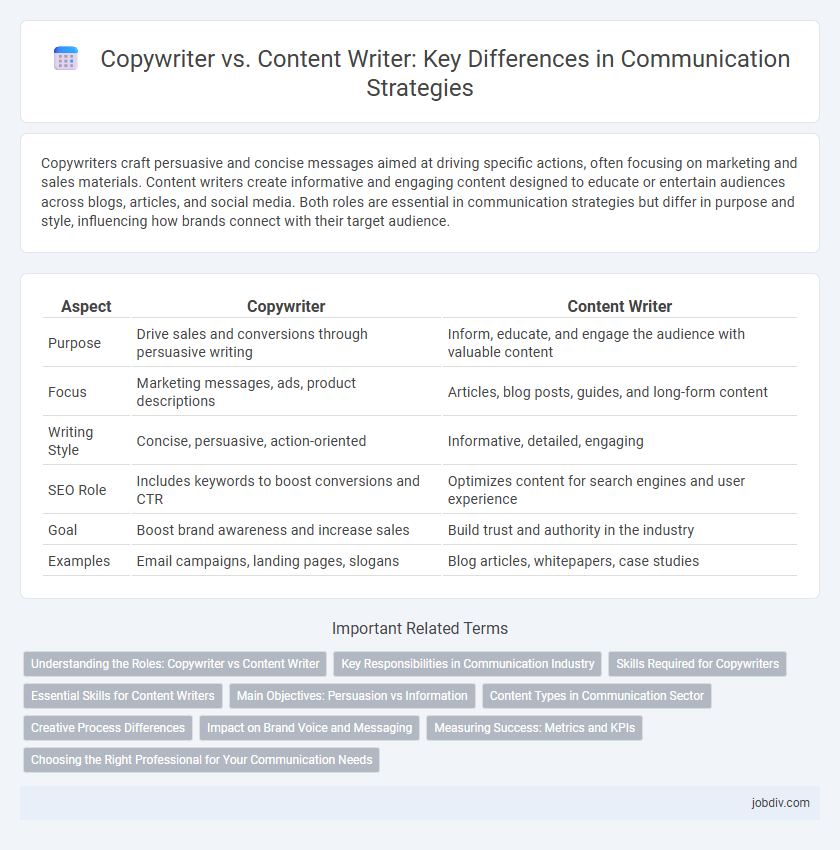Copywriters craft persuasive and concise messages aimed at driving specific actions, often focusing on marketing and sales materials. Content writers create informative and engaging content designed to educate or entertain audiences across blogs, articles, and social media. Both roles are essential in communication strategies but differ in purpose and style, influencing how brands connect with their target audience.
Table of Comparison
| Aspect | Copywriter | Content Writer |
|---|---|---|
| Purpose | Drive sales and conversions through persuasive writing | Inform, educate, and engage the audience with valuable content |
| Focus | Marketing messages, ads, product descriptions | Articles, blog posts, guides, and long-form content |
| Writing Style | Concise, persuasive, action-oriented | Informative, detailed, engaging |
| SEO Role | Includes keywords to boost conversions and CTR | Optimizes content for search engines and user experience |
| Goal | Boost brand awareness and increase sales | Build trust and authority in the industry |
| Examples | Email campaigns, landing pages, slogans | Blog articles, whitepapers, case studies |
Understanding the Roles: Copywriter vs Content Writer
Copywriters specialize in creating persuasive, concise text aimed at driving specific actions, such as sales or sign-ups, using compelling calls to action and attention-grabbing headlines. Content writers focus on producing informative, engaging, and valuable content like blog posts, articles, and guides designed to educate or entertain the audience while improving SEO performance. Both roles require strong writing skills, but copywriters prioritize conversion and marketing goals, whereas content writers emphasize audience engagement and long-term relationship building.
Key Responsibilities in Communication Industry
Copywriters craft persuasive and concise messages aimed at driving specific actions, such as sales or brand awareness, by creating headlines, taglines, and ad copy that resonate with target audiences. Content writers develop in-depth, informative materials like blog posts, articles, and whitepapers designed to engage, educate, and build trust over time through storytelling and detailed research. Both roles require strong communication skills, but copywriters emphasize conversion-focused language while content writers prioritize value-driven, SEO-optimized content.
Skills Required for Copywriters
Copywriters require a deep understanding of persuasive language, brand voice consistency, and the ability to craft concise, compelling calls-to-action that drive conversions. Expertise in market research, audience targeting, and SEO principles is essential to create impactful advertising copy across digital and print platforms. Strong editing skills and the capacity to adapt tone and style quickly enable copywriters to effectively influence consumer behavior and enhance brand engagement.
Essential Skills for Content Writers
Content writers must excel in research, SEO, and audience engagement to produce informative and relevant articles that drive organic traffic. Strong grammar, storytelling ability, and adaptability to various tones and formats are essential for crafting compelling content. Mastery of keyword optimization and content strategy also distinguishes effective content writers in digital communication.
Main Objectives: Persuasion vs Information
Copywriters specialize in crafting persuasive messages aimed at driving specific actions such as sales or sign-ups, using emotionally charged and compelling language to engage audiences. Content writers focus on delivering informative, valuable, and educational material designed to increase awareness, build trust, and support long-term audience engagement. Both roles require strong writing skills but differ fundamentally in their primary objectives: persuasion for copywriters versus information dissemination for content writers.
Content Types in Communication Sector
Copywriters specialize in creating persuasive and concise texts primarily for advertising, marketing campaigns, and promotional materials that drive conversions and brand engagement. Content writers focus on developing informative and engaging articles, blog posts, whitepapers, and social media content that educate audiences and support long-term communication strategies. Both roles contribute essential types of content to the communication sector, with copywriters targeting immediate action and content writers fostering sustained audience relationships.
Creative Process Differences
Copywriters prioritize persuasive language and succinct messaging to drive conversions, using concise calls-to-action and emotional triggers to captivate audiences quickly. Content writers focus on in-depth storytelling and informative structure, crafting comprehensive articles or blog posts that build brand authority and engage readers over time. The creative process for copywriters involves brainstorming punchy taglines and refining impactful headlines, while content writers dedicate more time to research, outlining, and developing detailed narratives.
Impact on Brand Voice and Messaging
Copywriters shape concise, persuasive messages that drive immediate consumer action, reinforcing a strong, consistent brand voice. Content writers develop in-depth, informative materials that build trust and engage audiences over time, supporting brand authenticity and narrative depth. Both roles harmonize to create a balanced brand messaging strategy that enhances customer connection and loyalty.
Measuring Success: Metrics and KPIs
Measuring success for copywriters typically involves conversion rate, click-through rate (CTR), and return on investment (ROI) metrics that reflect direct audience response and sales impact. Content writers are evaluated using metrics such as engagement rate, time on page, social shares, and organic traffic growth, emphasizing long-term brand awareness and audience retention. Both roles benefit from tracking bounce rate, keyword rankings, and lead generation to align content performance with business goals.
Choosing the Right Professional for Your Communication Needs
Copywriters specialize in creating persuasive and concise messages designed to drive action, making them ideal for advertisements, sales pages, and marketing campaigns. Content writers produce informative, engaging, and SEO-optimized material such as blog posts, articles, and whitepapers that build brand authority and audience trust. Selecting the right professional depends on your specific communication goals--opt for a copywriter to boost conversions and a content writer to enhance brand visibility and provide valuable information.
Copywriter vs Content Writer Infographic

 jobdiv.com
jobdiv.com